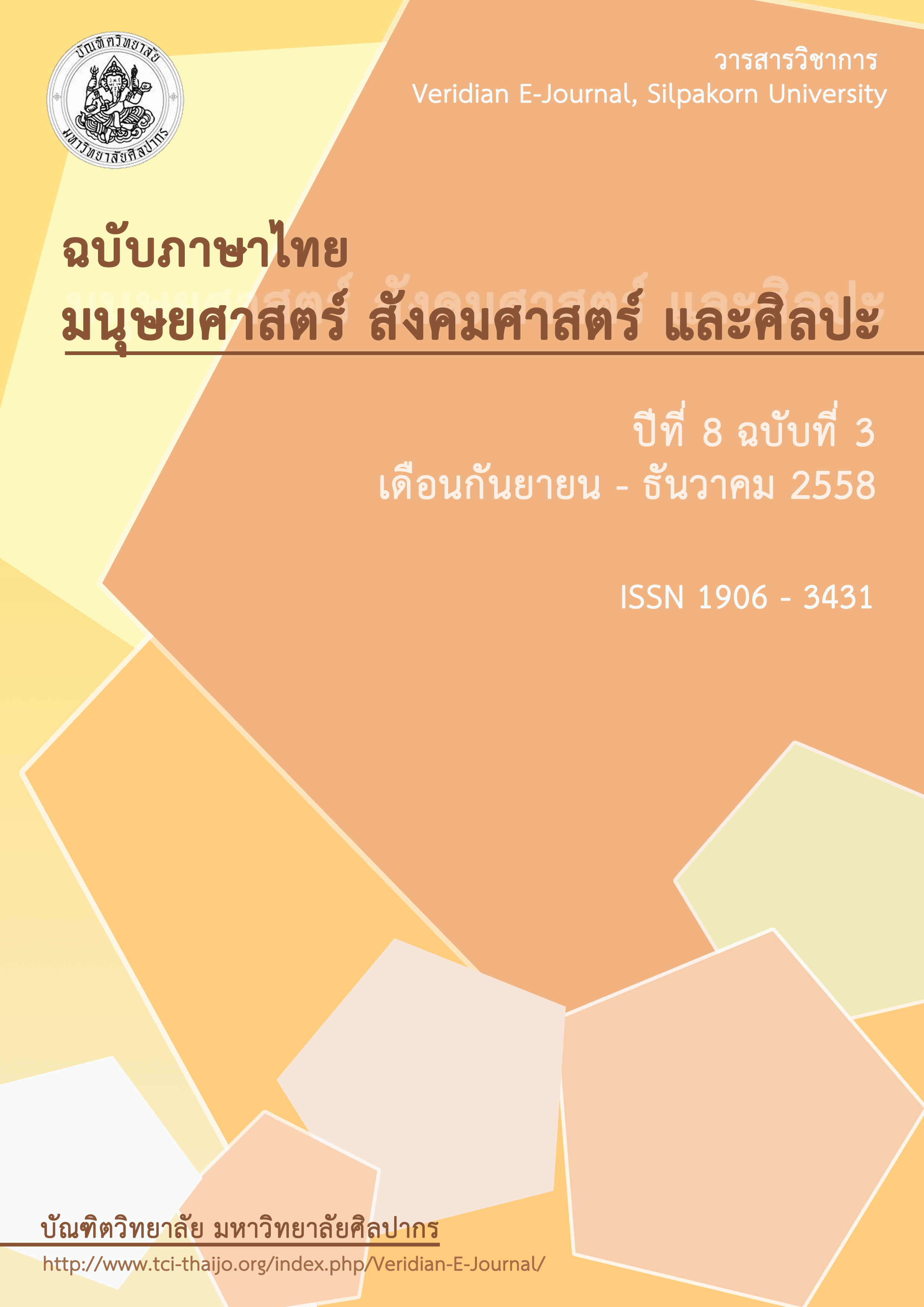สมรรถนะวิชาชีพครูโรงเรียนเอกชน ในสังกัดสำนักงานเขตพื้นที่การศึกษาพิษณุโลก เขต 1
Main Article Content
บทคัดย่อ
บทคัดย่อ
การวิจัยครั้งนี้มีวัตถุประสงค์ เพื่อ1.ประเมินสมรรถนะวิชาชีพครูโรงเรียนเอกชนในสังกัดสำนักงานเขตพื้นที่การศึกษาพิษณุโลกเขต1 2.ตรวจสอบความสอดคล้องของโมเดลสมรรถนะวิชาชีพครูกับข้อมูลเชิงประจักษ์ กลุ่มเป้าหมาย คือ ครูผู้สอนในระดับการศึกษาขั้นพื้นฐานในสังกัดสำนักงานเขตการศึกษาเอกชน พิษณุโลก เขต 1 จำนวน 12 โรงเรียน จำนวนครู 860 คน เครื่องมือที่ใช้ในการวิจัย คือ แบบประเมินสมรรถนะครูผู้สอนเพื่อใช้สำหรับการประเมินครูผู้สอน มีการตรวจสอบคุณภาพเครื่องมือ ด้านความตรงเชิงเนื้อหา (IOC) จากผู้เชี่ยวชาญ มีค่าเท่ากับ 0.98 และการตรวจสอบด้านความเที่ยง (Reliability) มีค่าสัมประสิทธิ์แอลฟาครอนบาค เท่ากับ 0.99 มีขั้นตอนการดำเนินการวิจัย ดังนี้ ขั้นที่ 1 ศึกษาสมรรถนะ สังเคราะห์ สมรรถนะวิชาชีพครูโรงเรียนเอกชน โดยการศึกษาแนวคิดทฤษฎีจากเอกสารงานวิจัย การสัมภาษณ์ผู้ทรงคุณวุฒิ เพื่อใช้เป็นกรอบแนวคิดสมรรถนะวิชาชีพครู และ สร้างแบบประเมินสมรรถวิชาชีพครู จากผลการสัมภาษณ์ผู้ทรงคุณวุฒิ ขั้นที่ 2 การประเมินสมรรถนะวิชาชีพครูโรงเรียนเอกชน และตรวจสอบความสอดคล้องของโมเดลสมรรถนะวิชาชีพครู และสถิติที่ใช้ ความถี่ ร้อยละ ค่าเฉลี่ย ส่วนเบี่ยงเบนมาตรฐานและการวิเคราะห์องค์ประกอบเชิงยืนยัน Confirmatory Factor Analysis (CFA) ผลการวิจัย พบว่า สมรรถนะหลัก (Core Competency) มีผลการประเมินอยู่ในระดับมาก ค่าเฉลี่ยเท่ากับ 3.45 โดยด้านที่มีผลการประเมินอยู่ในระดับมากที่สุด คือ การบริการที่ดี และวินัย คุณธรรมและจรรยาบรรณาวิชาชีพครู ส่วนด้านอื่นๆอยู่ในระดับมาก และสมรรถนะประจำสายงาน (Functional competency) มีผลการประเมินอยู่ในระดับมาก ค่าเฉลี่ยเท่ากับ 3.36 โดยมีผลการประเมินอยู่ในระดับมากทุกด้าน โดยด้านการจัดการเรียนรู้และการบริหารจัดการชั้นเรียน และการพัฒนาผู้เรียนที่เน้นผู้เรียนเป็นสำคัญมีค่าเฉลี่ยสูงสุด
ผลการตรวจสอบ ความสอดคล้องของโมเดลสมรรถนะครูกับข้อมูลเชิงประจักษ์ พบว่า สอดคล้องตามโมเดลการวัดสมรรถนะวิชาชีพครูในสมรรถนะหลัก จำนวน 7 องค์ประกอบ พบว่า ค่าน้ำหนักองค์ประกอบเรียงจากมากไปน้อย ดังนี้ 1) จิตวิทยาสำหรับครู2) ความเป็นครู 3) การพัฒนาตนเอง 4) การมุ่งผลสัมฤทธิ์ 5) การทำงานเป็นทีม 6) การบริการที่ดี7) วินัย คุณธรรมและจรรยาบรรณาวิชาชีพครูนอกจากนี้ สอดคล้องตามโมเดลการวัดสมรรถนะวิชาชีพครูในสมรรถนะประจำสายงาน จำนวน 9 องค์ประกอบ ดังนี้ 1) ภาวะผู้นำครู 2) การพัฒนาหลักสูตร 3) การสร้างความร่วมมือกับชุมชน 4) วิเคราะห์สังเคราะห์และการวิจัยทางการศึกษาเพื่อพัฒนาผู้เรียน 5) การวัดและการประเมินผลการศึกษา 6) ภาษาเทคโนโลยีสำหรับครูและนวัตกรรมเทคโนโลยีสารสนเทศทางการศึกษา7) ความรู้ในเนื้อหาวิชา8) การพัฒนาผู้เรียนที่เน้นผู้เรียนเป็นสำคัญ 9) การจัดการเรียนรู้และการบริหารจัดการชั้นเรียน
Abstract
The purposes of the study of private schools teachers’ competencies in Phitsanulok Primary Education Service Area Office 1 were 1) to evaluate the competencies of teachers in this area and 2) to verify the model of the teachers’ competencies with empirical data. The sample of research data was collected from one of the 12 schools’ teachers in the basic education in Phitsanulok Primary Educational Service Area Office 1. 860 teachers were interviewed to evaluate teachers’ actual conditions and to receive the information on the performance of teachers to be used as a teacher’s competency framework. There are two steps as follows: 1) study competencies, synthesize private school teacher’s competencies by reviewing theories and researches for literature review, and interview eight experts as a teacher’s competencies framework. 2) evaluate and verify the teachers’ competencies model. The results of the interview process, the two experts to assess the teachers’ competencies of private schools, and a quality instrument was used by experts to determine the content validity (IOC) and to reliability. It was found that the alpha coefficient was 0.98 and 0.99 respectively. The statistical methods that were used were frequency, percentage, average, standard deviation and Confirmatory Factor Analysis (CFA). The assessment and teachers’ competencies in Phitsanulok Primary Education Service Area Office 1,
The results showed that the core competencies had high evaluation with a mean of 3.45, good service and discipline, integrity and professional ethics, others were at the highest level, and other factors were at a high level. The functional competency was at a high level with the mean of 3.36, with a high level of all factors of learning management, and management classes and to develop student-focused learner which were higher than another factors. The results of the verification of the teachers’ competencies model with empirical data showed that core competency had seven factors from high to low: 1) psychology for teachers, 2) teacher profession, 3) development, 4) aims of achievement 5) teamwork 6) good service, and 7) discipline, integrity and professional ethics, and the teacher’s competencies of the work. The functional competencies were evaluated over nine factors: 1) leadership, 2) curriculum development, 3) creation of partnerships with communities, 4) analysis, synthesis, and educational research to develop learners, 5) measurement and evaluation, 6) studies, language technology and innovation, information technology, and teacher education, 7) knowledge of the subjects, 8) development of student-focused learning, and 9) learner management, and class management.

